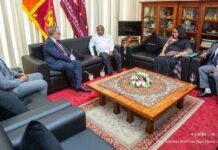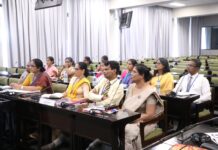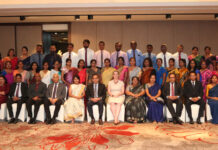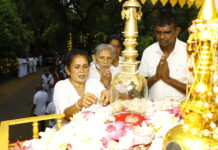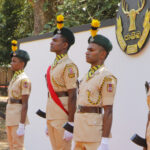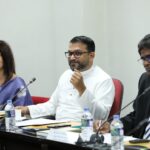Lord Tariq Ahmad of Wimbledon, Minister for South Asia, the United Nations and the Commonwealth at the Foreign, Commonwealth and Development Office of the UK, planted a Kumbuk (Terminalia arjuna) sapling at the Bellanwila – Attidiya Bird Sanctuary last week.
The Department of Wildlife said Lord Ahmad had been joined by the British High Commissioner in Colombo Sarah Hulton, Hasanthi Urugodwatte Dissanayake, Acting Additional Secretary of Ocean Affairs, Environment and Climate Change at the Foreign Ministry, Saman Liyanagama, Wildlife Ranger of the Colombo Wildlife Range, Department of Wildlife Conservation and Professor Sevvandi Jayakoddy, Senior Lecturer of the Wayamba University.
The planting activity was followed by a brief visit to the wetland and Prof. Jayakoddy, and Liyanagama explained the importance of wetland ecosystems as well as challenges in conservation and maintenance, while Dissanayake briefed him on the Sri Lanka’s pioneering work related to mangrove restoration and conservation, both at policy level as well as at the ground level.
Hasini Sarathchandra, Publicity Officer, Department of Wildlife Conservation said British High Commission in Colombo with the International Water Management Institute Headquartered in Sri Lanka, had already launched a project under the Darwin Initiative at the Baddegana Wetlands. Similar collaborations are envisaged involving the Bellanwila – Attidiya Bird Sanctuary.
Wetlands play an important role in our natural environment. They mitigate the impacts of floods, absorb pollutants and improve water quality. They provide habitat for animals and plants and many contain a wide diversity of life, supporting plants and animals that are found nowhere else. Colombo is a city built on and around wetlands. Despite progressive loss and degradation, wetlands still cover some 200 km2 of the Colombo metropolitan area and suburbs.
The wetlands are fundamental to the well-being of the people of Colombo and its suburbs. The wetlands can reduce extreme air temperatures and make the city more live able due to evaporative cooling. The wetlands provide a critical land-mass which helps to maintain the richness of Colombo’s biodiversity.
The Bellanwila-Attidiya wetlands was declared as a bird sanctuary on 25 July 1990, due to biodiversity of the area and its contribution to controlling floods. The wetlands, which span over 930 acres, host endemic species and is a paradise for migratory birds. 44 species of fish including 06 which are endemic to the country have been identified in the Bolgoda River which flows through the wetlands.
The wetlands are also home to 21 reptilian species, 17 species of mammals and 10 butterfly species. Bellanwia-Attidiya sanctuary falls within the upper catchment of the Bolgoda river basin. The Department of Wildlife Conservation manages the Bellanwila-Attidiya Sanctuary.
Selection of the location was also due to the close collaboration that Sri Lanka has with the Government of the UK on conservation of mangroves and wetlands.






